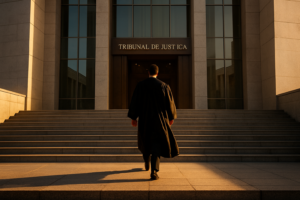Non-compliance with a precautionary measure may result in the imposition of more stringent measures and, in extreme cases, in the decree of preventive detention. In today’s article, we explain which precautionary measures are provided under Brazilian legislation and what happens when they are violated.
What Are Precautionary Measures?
Precautionary measures are legal instruments used to ensure the effectiveness of criminal proceedings, prevent new offences, and secure the enforcement of the law. Article 282 of the Code of Criminal Procedure requires the judge to assess the seriousness of the offence, the circumstances of the facts, and the personal conditions of the suspect or defendant before imposing restrictions.
These measures constitute a form of judicial control that seeks to balance the interests of criminal prosecution with the fundamental right to liberty, applying only what is strictly necessary for the protection of the proceedings.
Custodial Precautionary Measures
Precautionary measures that directly restrict the right to come and go include:
• Arrest in flagrante delicto – when the perpetrator is caught in the act or immediately after the offence, or found with objects indicating authorship.
• Preventive detention – ordered to safeguard public or economic order, ensure criminal investigation, or secure the enforcement of criminal law.
• Temporary detention – used during investigations, particularly when the suspect has no fixed address or when further evidentiary development is required in serious offences.
These measures are exceptional in nature and must be reviewed periodically, being imposed only when less restrictive measures prove inadequate or ineffective.
Precautionary Measures Other Than Detention
In addition to deprivation of liberty, the judge may impose alternative measures, such as:
I. Periodic court appearance;
II. Prohibition from visiting certain places;
III. Prohibition from contacting specific individuals;
IV. Prohibition from leaving the judicial district;
V. Night-time and weekend house arrest;
VI. Suspension from public office or economic activity;
VII. Provisional involuntary commitment;
VIII. Bail;
IX. Electronic monitoring.
These measures must be evaluated and ordered according to their proportionality, adequacy, and necessity in relation to the case at hand.
Non-Compliance with Non-Custodial Precautionary Measures
Failure to comply with a precautionary measure may lead to serious consequences, allowing the judge to:
- Replace the measure with a more stringent one;
- Accumulate it with additional measures;
- Order preventive detention as a last resort, when there is a risk to criminal investigation or to the enforcement of criminal law (Articles 282 §4 and 312 of the Code of Criminal Procedure).
Therefore, even seemingly simple measures — such as periodic reporting or contact restrictions — must be strictly complied with, since non-compliance may lead to the loss of provisional liberty or to the decree of preventive detention.
Role of the Defense Attorney – Safeguarding Liberty
Non-compliance with a precautionary measure may result in stricter restrictions, which is why the role of the criminal defense attorney is essential in providing justifications, requesting revisions, and safeguarding the right to liberty. Proper legal representation reduces risks, ensures proportionality, and contributes to the regular progress of the criminal proceedings.
For those seeking to better understand the importance of crisis management in criminal defense — particularly in cases of high visibility and public repercussion — we recommend reading other articles available on this blog.




